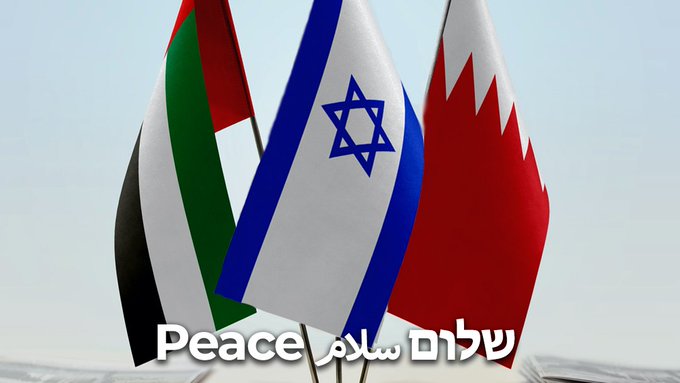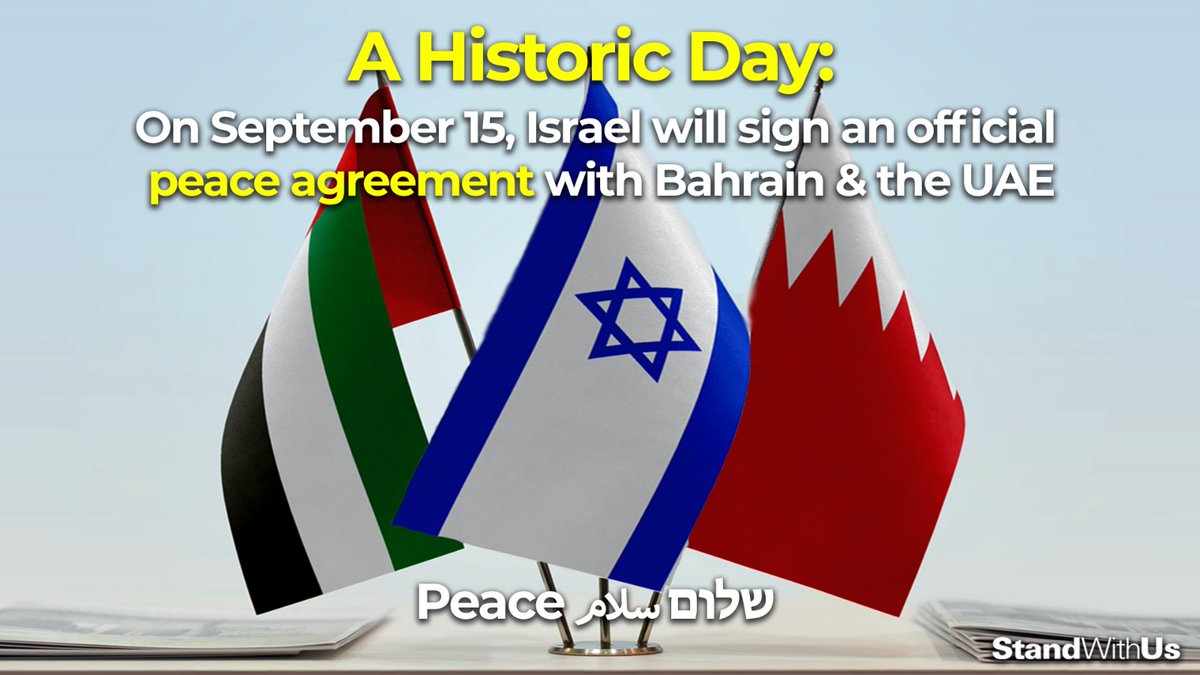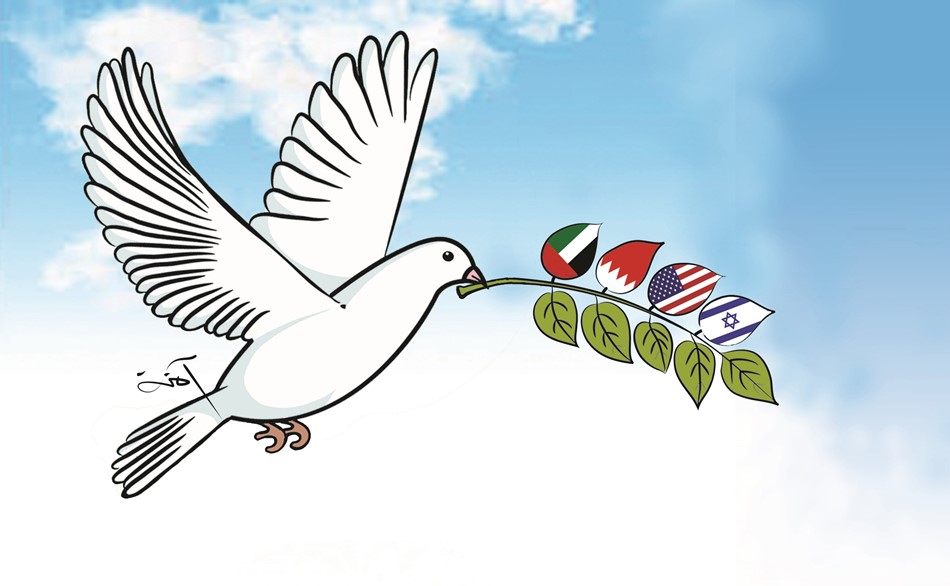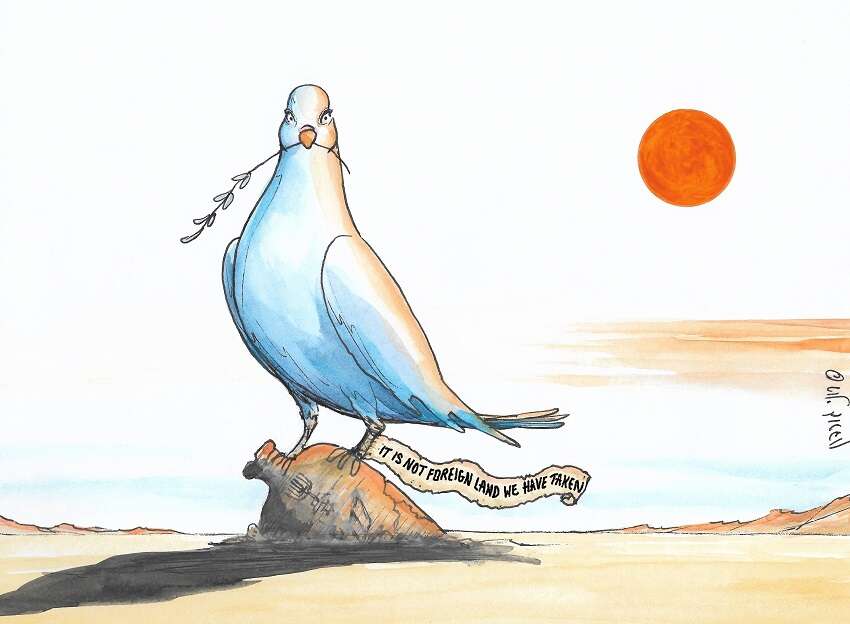The tender photo that just might signal start of true change in Arab-Israel ties
On Monday afternoon, a day before the Israel-UAE-Bahrain peacemaking ceremony at the White House, US President Donald Trump’s adviser Avi Berkowitz posted a quite beautiful photograph on Twitter. It shows Jared Kushner, the president’s senior adviser and son-in-law, handing a Torah scroll to His Majesty King Hamad bin Isa bin Salman al-Khalifa of Bahrain, to be used in a synagogue in the kingdom.
The moment is tender and moving — with the gazes of both men focused on the velvet-covered scroll rather than each other, respectful of it. It is a picture of transition and of trust — an American Jewish official entrusting an Arab monarch with the Jewish people’s most sacred text, for his safekeeping, to convey to a Jewish community free to practice its religion in his country.
Kushner has called the process of peacemaking we are now witnessing between Israel and, so far, the UAE and Bahrain, “the beginning of the end of the Israel-Arab conflict.” If that proves to be the case, this photograph may come to symbolize it.
There is no end of realpolitik in the new alignments. Israel has gradually impressed upon the neighborhood that it has millennia of roots here, that it is not going anywhere, that it is no pushover, and that it is well capable of defending itself. Its emerging new partners share a common concern about the Iranian regime’s rapaciousness and aggression, and recognize that Israel can be a critical ally against Tehran. The deals also open opportunities for warmer ties with Israel’s dependable US ally, and likely arms sales as a direct consequence. Also, decades of the Palestinians’ intransigence have reduced sympathy for their cause in at least parts of the Arab world — or at least reduced the readiness of parts of the Arab world to subjugate their own perceived interests to those of the Palestinians.
Still, Israel’s new partners did not abandon the Palestinians. A central element of the UAE deal was Prime Minister Benjamin Netanyahu’s agreement to indefinitely suspend his plan to unilaterally annex up to 30 percent of the West Bank — the Biblical Judea and Samaria — including all the settlements. Trump had indicated early in his presidency that he was no particular supporter of settlement expansion; Kushner made explicit last week the concern that Israel, via the settlement enterprise, “would have eaten up all the land in the West Bank” if the administration hadn’t put out its January peace vision. And Netanyahu, laudably and politically problematically, chose the historic opportunity of a wider circle of peace for Israel over a unilateral push for wider Israeli sovereignty.
The moment Jared Kushner gave His Majesty King Hamad bin Isa bin Salman al-Khalifa of the Kingdom of Bahrain a Torah scroll for a Synagogue in Bahrain pic.twitter.com/RvPif5x51I
— Avi Berkowitz (@aviberkow45) September 14, 2020
Exclusive: We will not be prisoners of the past, says Israeli PM's aide
Jews in the Middle East were better off than their counterparts in the Christian Europe for many years, and by leaving behind the hostilities of the past, the UAE and Israel are showing the world how historical animosities can be overcome and partnerships built for future, Mark Regev, Senior Advisor to Benjamin Netanyahu, the Prime Minister of Israel, told Khaleej Times in an exclusive interview.Colin Rubenstein: Deals between Israel, UAE and Bahrain shatter old barriers
"For many years, Jews in the Muslim Middle East were treated much better than the Jews in the Christian Europe. There were traditions of religious tolerance in Islam at a time when it was not present in Christian Europe. We are all the children of Abraham. The conflict between us in the last decades were an aberration," said Regev over telephone on Monday from Washington D.C, where the UAE and Israel will sign the historical Abraham Accord on Tuesday, September 15.
The US-brokered peace deal, which Trump announced on August 13, will see both the countries establishing diplomatic relations, and Israel agreeing to halt its controversial annexation in the occupied West Bank.
The UAE is the first GCC nation to normalise relations with Israel, and the third Arab country to do so after Egypt and Jordan.
Speaking about the scars of the decades-long hostilities between Arabs and Jews in the region, Regev said people cannot forever remain imprisoned in the past.
"No one can forget the past. In my country, of course, there are many memories from the Arab-Israeli wars. But there is a difference between knowing the past and being aware of the past and being imprisoned by it."
The official said both Israel and the UAE are countries that "embrace the future".
The Palestinian leadership’s very strong response to the UAE and Bahraini moves – and the anger this has generated in Persian Gulf states – only underscores how the traditional Palestinian approach of all or nothing has become a major obstacle to peace for the region. It is the reason the Palestinians turned down repeated Israeli offers of statehood that met almost all Palestinian aspirations, in 2000, 2001 and 2008.Arsen Ostrovsky: Palestinians Never Miss an Opportunity to Miss an Opportunity
Meanwhile, the UAE and Bahraini decisions to normalise relations with Israel almost certainly occurred with the blessing of Riyadh. Saudi Arabia may not quickly follow suit, but it is nonetheless very much a part of the new Middle East alignment.
The UAE and Bahrain normalisation deals with Israel are therefore the tip of a much wider regional iceberg of changing strategic thinking that signals a far-reaching re-alignment.
At a time when the US is committed to drawing down its troops from the region, Western-aligned Arab states are recognising the value of partnering more openly with Israel in their common goal of thwarting Iran’s expansionism and deterring aggression.
There is every reason to hope these deals will empower the Western-leaning Sunni Arab grouping through more open ties with Israel, boosting stability, expanding co-operation on defence and intelligence affairs, trade, investment and joint technological development, and the potential for increased cross-cultural dialogue. Meanwhile, it should weaken the rejectionist forces determined to destabilise the region, especially Tehran and its Hezbollah proxy in Lebanon; the Assad regime; Turkey’s Islamist ruler Recep Tayyip Erdogan; Hamas and the Muslim Brotherhood.
These normalisation agreements are a hugely positive watershed development. Australia, where Foreign Minister Marise Payne and opposition foreign affairs spokeswoman Penny Wong have welcomed both deals, should now lend its diplomatic weight to helping encourage other Western-leaning Arab and Muslim allies to follow suit.
The United States was not prepared to sit idly by while the Palestinian leadership held ransom Israel's normalization with Arab and Gulf countries, thereby also holding back real progress and hope of a better future for everyone else in the region.Commentary Magazine Podcast: A New World Order
As Jared Kushner noted, President Trump has sought to "align the different countries in the region around their common interests, as opposed to focusing on historic grievances."
One of those common interests was Iran. Contrary to the conventional wisdom of the United Nations and the European Union, the United States also understood that it was not Israel, but rather the Islamic Republic of Iran, that was the main destabilizing force in the Middle East—and the one that could also unite Israel with the Arab and Gulf countries which Iran also threatens.
Therefore, the U.S. turned the entire conventional wisdom upside-down and proved all the naysayers and so-called "experts," who said peace in the Middle East must first go through Ramallah, wrong.
What we are witnessing today is nothing short of a full paradigm shift in the geopolitics of the region—not only normalization between Israel and Arab countries, but recognition of the importance of laying the foundations for a warm, durable peace, from the bottom up and not from the top down.
The only question remains: Will the Palestinian leadership follow the courageous lead of the UAE and Bahrain, look to the future and make peace with Israel—or continue to miss the opportunities before them, thereby consigning their own people to further misery?
The realignment of geopolitics in the Middle East has many fathers, and Donald Trump was only one of them. What the thaw in Sunni states’ relations with Israel means for America moving forward. Also, for all the talk of the president’s “white grievance” politics, he’s performing better among minority voters in polls than he did in 2016 while white voters are fleeing his coalition.






































